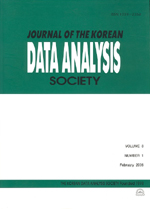심적 시뮬레이션 유형이 확장브랜드 제품 평가에 미치는 영향
A Study on the Differnence of the Appraisal of Extended Brand by Mental Simulation Types
- 한국자료분석학회
- Journal of The Korean Data Analysis Society (JKDAS)
- Vol.12 No.2
-
2010.041067 - 1076 (10 pages)
- 18

본 연구는 심적 시뮬레이션 유형에 따라 브랜드확장 제품 평가에 차이가 있는 지를 알아보기위해 실시되었다. 본 연구 결과를 요약하면 다음과 같다. 첫째, 제품 평가에 있어 유사확장의 경우 결과중심적 시뮬레이션 집단은 통제집단보다 브랜드확장 제품을 더 긍정적으로 평가했지만,비유사확장의 경우에는 브랜드확장 제품의 이성적 평가(품질)에서 과정중심적 시뮬레이션 집단이 통제집단보다 브랜드확장 제품을 더 부정적으로 평가하였다. 둘째, 구매의도 평가에 있어 유사확장의 경우 결과중심적 시뮬레이션 집단은 통제집단보다 브랜드확장 제품에 대한 구매의도를더 높게 평가한 반면, 비유사확장의 경우에는 심적 시뮬레이션과 통제집단간 차이가 없는 것으로 나타났다. 셋째, 성공확률 예측에 있어 유사확장에서는 결과중심적 시뮬레이션 집단이 통제집단보다 성공확률을 더 높게 예측한 반면, 비유사확장에서는 과정중심적 시뮬레이션 집단이 통제집단보다 성공확률을 더 낮게 예측하였다.
In this study we asked the difference of the extended brand appraisal by mental simulation types. In short, we have the following results. First, in similar extension outcome-focused simulation group evaluated the extended brand more positively than process-focused simulation group did. In non-similar extension process-focused simulation group evaluated the extended brand more negatively than control group did. Second, in similar extension outcome-focused simulation group had more purchase intention than process-focused simulation group did. But in non-similar extension there was no difference of purchase intention between mental simulation group and control group. Third, in similar extension outcome-focused simulation group predicted higher success probability for extended brand than process-focused simulation group did. But in non-similar extension processfocused simulation group predicted lower success probability for extended brand than control group did.
Ⅰ. 서론
Ⅱ. 이론적 배경 및 가설 설정
Ⅲ. 실험설계 및 결과
Ⅳ. 결론
참고문헌
(0)
(0)